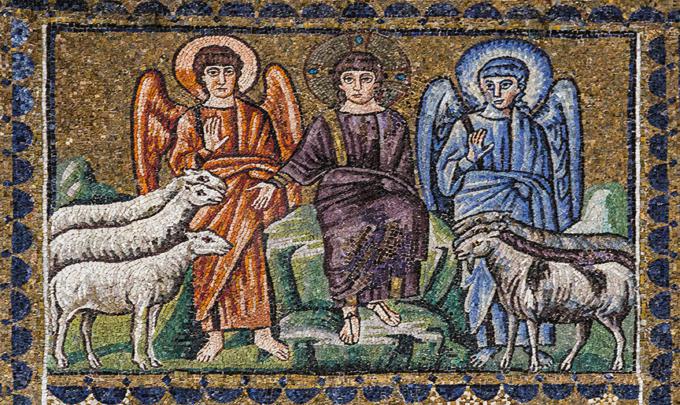
Faith
The sheep did not receive any special insight or advantage over the "goats." Nevertheless, they ministered to the needs of the people they encountered. I think Jesus wants us to go deeper and ask why.

Wolfe
I love it when Thanksgiving and the Solemnity of Christ the King converge. (It's almost worth the stress of celebrating Masses for the Fourth Sunday of Advent, Christmas Eve, and Christmas Day all within 24 hours as we will this year.)
There is something very fitting about giving thanks and setting our sights beyond the horizons of this earthly existence simultaneously. And while Thanksgiving is a national holiday and not a liturgical feast, it's a perfect way to make the transition between the blessings of where we are now and where we eventually hope to be.
Here's why. Heaven is what surrounds the presence of the Most High. But the Scriptures tell us that if we want to be in God's presence, thanksgiving and praise are how we can be. "Enter his gates with thanksgiving, and his courts with praise! Give thanks to him, bless his name!" (Ps 100:4). When prayer feels like we're talking to ourselves, when we can't remember the last time we felt God's presence, there is something we can do. Thanking God for what he has done and praising him for who he is changes everything. And there's always a reason to thank God.
Knowing how to enter God's presence is half the equation. In the Gospel reading for Christ the King this year, we see how Jesus will eventually come to us. The depiction of the last judgment in Matthew 25 challenges everyone. The Lord's words to his faithful are as familiar as they are consoling: "I was hungry and you gave me food, I was thirsty and you gave me drink, a stranger and you welcomed me, naked and you clothed me, ill and you cared for me, in prison and you visited me." On the contrary, his words to the "goats" are jarring: "I was hungry and you gave me no food, thirsty and you gave me no drink, a stranger and you gave me no welcome, naked and you gave me no clothing, ill and in prison, and you did not care for me."
But if we focus only on what the King of Kings says to those assembled before his throne, we are likely to miss an important detail. There is absolutely no difference whatsoever between how the "sheep" and the "goats" respond. Both groups ask Christ the same question: "Lord, when did we see you?"
Those who followed Jesus then -- and now -- might have expected that those he called "good and faithful servants" had recognized Jesus in the least among them. They had not. The sheep did not receive any special insight or advantage over the "goats." Nevertheless, they ministered to the needs of the people they encountered. I think Jesus wants us to go deeper and ask why.
As is the case for many of Jesus' parables, the answers are not as cut and dry as we might like them to be. The fact is that we don't need to see Jesus to serve him faithfully. But we do need to recognize that we ourselves have been blessed. Gratitude is what ultimately separates the sheep from the goats, those who inherit eternal life from those who don't.
The Incarnate Son of God hid among his chosen people. He hides under the appearance of bread and wine as Eucharist. And as St. John Paul once wrote in a poem, "Learn from me, my dear ones, how to hide, for where I am hidden, I abide." God is hidden everywhere, and he wants to be found. In Matthew 25, Jesus tells us that he lives among those with whom we are called to share our blessings. We don't have to see him to know that he is there -- or to understand that at the end of all things is gratitude.
- Jaymie Stuart Wolfe is a Catholic convert, wife, and mother of eight. Inspired by the spirituality of St. Francis de Sales, she is an author, speaker, and musician, and provides freelance editorial services to numerous publishers and authors as the principal of One More Basket. Find Jaymie on Facebook or follow her on Twitter @YouFeedThem.
Recent articles in the Faith & Family section
-
7 reasons to pray for the cardinals in conclaveJaymie Stuart Wolfe
-
Legacies in Ordinary TimeLucia A. Silecchia
-
What are my Easter duties?Jenna Marie Cooper
-
On the Camino: Jentillaks and jazzMark T. Valley
-
From the Eternal CityArchbishop Richard G. Henning























